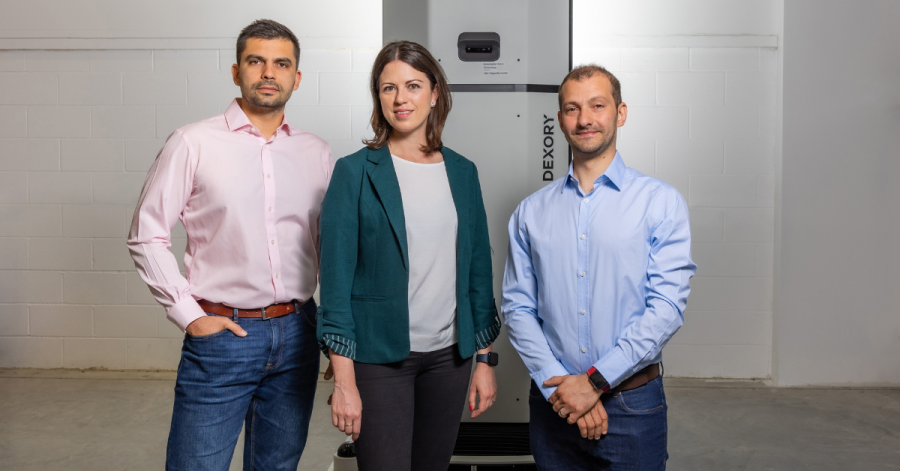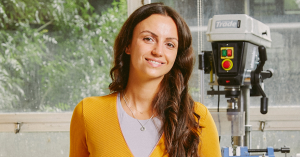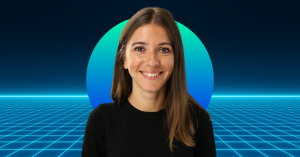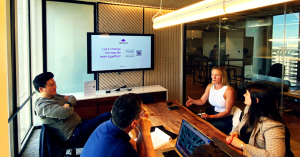Only have 1 minute? Here are 3 key takeaways:
- Dexory is building autonomous robots for warehouses, capturing real-time data to streamline inventory management.
- Dexory received almost $40M in funding from grants, Atomico, Lakestar, Maersk Growth, DB Schenker Ventures, and others.
- The UK’s startup ecosystem supports Dexory’s growth, but post-Brexit, hiring challenges emerged, impacting access to global talent.
Dexory, a UK-based key player founded by 3 Romanians in the robotics and logistics realm, is an all-in-one solution that helps businesses have real-time visibility of their inventory and increase the efficiency of their warehouse operations. With a team of over 100, the company has experienced remarkable growth, working now with big names like DB Schenker, Maersk, Menzies Aviation, IB Cargo, and others.
The company’s global footprint extends beyond its UK headquarters, reaching markets worldwide, with a recent expansion into the US.
To understand more about the startup’s trajectory and how it was for the three Romanian founders to start and grow a company in the UK, we talked to Oana Jinga, co-founder and chief commercial and product officer. This interview, in written and audio form, explores Dexory’s trajectory—originating nine years ago, navigating the intricate landscape of Brexit, to securing around $40 million in funding.
*The written text is slightly modified for context and readability. For the original conversation, please listen to the audio file at the beginning of the article.
The Recursive: What does a Chief Commercial and Product Officer do?
Oana Jinga: On the commercial side, I look after our external audiences, customers, sales team, and marketing, and also on the investment side after our current and potential investors. From that commercial angle, that’s where it all comes from. On the product side, I look after the product team, taking external inputs and feedback from the market, feeding that back into the product, and understanding how to bridge the gap to build something fit for our customers.
How many people do you have in your team and where are they located?
In my team, there are about 15 people now. As a company altogether, we’ve grown from about 30 people a year ago to just over 100. The commercial side has scaled up significantly, especially over the past few months after our product was launched and we started growing in the market.
Most of the people are in the UK and it’s the only office we have at the moment. We’re lucky to have people from 25 nationalities working all over the world and we’ve just launched our first customer in the US, so we may expand the team there. We’ve been fortunate to attract talent to our offices in London, where we have our office facility, and close to Oxford, where there’s the production facility. We also have team members from the CEE region, and there are plans to explore setting ourselves in the region for production and R&D.
Could you explain what Dexory does in simple terms, for a five-year-old?
We have some tall robots with lots of cameras, sensors, and lights—essentially, a giant scanner designed for scanning warehouses. It’s quite straightforward. It moves between different aisles of the warehouse, capturing pictures and information of everything it sees. For our customers, the warehouse owners, or managers, can track their goods inside the warehouse in real-time. This allows them to quickly understand what’s placed where, and with that data, update other internal systems to ensure all stock information is up to date. We handle both the robotic side and all the data capturing on the robot itself, including data manipulation and interpretation. Finally, we’ve got this interesting portal called Dexory View, a digital twin portal. All the data we capture can be easily and nicely visualized there, enabling our customers to understand it quickly with just a click of a button. So, we’re an end-to-end provider, covering everything from creating the actual robots to the development of the digital twin and ensuring its maintenance.
How many clients do you have, and in which markets are they?
We work with big global companies like DB Schenker, Maersk, Menzies Aviation, IB Cargo, and others. With Maersk for example, we live in two countries, preparing the third. We can adapt our solution based on our customer’s market and operate globally.
You started with a different name, but last year you changed it. Why did you rebrand from “BotsAndUs” to “Dexory”?
“BotsAndUs” was our initial brand when we started almost nine years ago with a focus on companion robots. Over time, we shifted to B2B robotics and logistics. The rebrand to “Dexory” was to better represent our broader offerings, including data capture, digital twin, and insights beyond just robots.
You are 3 Romanian founders who started a business in the UK in 2015, before Brexit. What can you tell us about your experience and how it changed after Brexit?
We started the business here because we were already here. We were established for quite a few years. Myself and Andrei came here to study, Adrian came quite quickly after he finished university with his first job. We were already kind of settled here and we didn’t have plans at the time to move anywhere else. So it kind of felt natural for us to start something here. I don’t think we even thought about not starting here.
Regardless of Brexit or not, I just feel the UK is focused on the business community. Everything is accessible fast and quick and it just kind of naturally makes a very good business environment. One can also consider all the funding available here. Apart from the VCs, because London is one of the main ports in Europe for it, there was also local government funding at the time and you could also access EU funding. You can still do it to an extent now. London is well-positioned to support your businesses, there are a lot of little accelerators and co-working spaces. Because we’re making hardware, it was easy to find a hardware co-working space where we had access to machinery. Hence it wasn’t hard for us. Of course, it’s still tons of hard work to start a business but at least you know that the basics are there and you don’t have to worry about that.
In the next stage when we grew quite a bit it was fantastic before Brexit because you could just hire anyone from within the EU and you didn’t have to worry about sponsoring visas and paying a lot of taxes. That was the main shock for us once Brexit happened and the whole legislation came into the space. We realized how expensive it is for a small business to hire people from outside of the UK. I think this is the main challenge now: if you want to access some amazing people, there’s quite a bit of money that you have to pay. Which a small business can’t afford.
To date, you raised three rounds totaling almost ~$40M. What was your experience with each of these rounds?
Yes, we had three rounds and the ~$40M also includes some of the early grants that we had. When you compare them to the amount of VC investment, they’re not that much, but at the time, they were incredible. The first grant we had was just about $100K from the UK Government through a scheme called Innovate UK. But at the time for us three people, it was what enabled us to be able to work full-time on the company, which was fantastic. Then we had a €2.5M grant from the EU, which again gave us a massive boost. After that, all the investment rounds came.
What we’re building it’s a very complex hardware product. To be honest, the first time we went out for VC funding, everyone was like “Yeah, sure, good luck with that”. We continued and with the grant support, we managed to build the product, take it to market, have the first customers and when we went back to the same investors, they were mind-blown. We got a term sheet almost instantly.
In the last round, Atomico joined us, and before that, we had Lakestar. At the earlier stage, we had Kindred Capital and Capnamic. We also have two CVCs: Maersk Growth and DB Schenker which joined us after Series A, after both of them started to use our product, which I think is a great testament to the trust that they have in us.
What about you, as an entrepreneur and a founder? What would you tell yourself from eight years ago, with the experience you have today?
When faced with a challenge, I think that most of us say that if this happens, then everything will be sorted. And then it happens and you realize that there’s a million other problems. It never gets easy, it gets much more complicated, but you become much more resilient. So I would tell myself that it never gets easy, but you’ll get through it.
Can you share your experience before Dexory, how you got to the UK, and what you worked on?
I started my career in PR in Romania and then transitioned to the UK to finish my university. I had a mix of theoretical Romanian education and practical British education. I worked in PR initially, then moved into tech marketing, working for Telefonica and Google. The combination of education helped me throughout my career. I transitioned to Dexory full-time after working in parallel for a while.
What recommendations do you have for founders from CEE selling their innovation to the UK?
The UK customer is a bit more reserved than people think. They require more data points to make decisions, especially for mid to large-sized companies. For larger companies, building relationships physically is essential, and patience is crucial as decisions take time.
What are your plans for Dexory in the next three to five years?
From a geographical perspective, we want to establish our presence in the US after just launching there. Our team will continue to grow, but the next few months will help settle things down. From a product perspective, we’re focusing on using AI, machine learning, and computer vision to extract more from the data we collect and help optimize warehouse operations.
Are you planning a Series B in the near future?
You’re always planning for the next one when you’re done with the first one. We were lucky to have momentum after the seed and Series A. As soon as we’re done with that, we start thinking about how to structure ourselves for the series B, who we want, and what we need to hit. Series B is a different beast, and hitting significant numbers is crucial.
How do you see the next year, considering economic forecasts and potential challenges?
If you have a good idea and a good company, you’ll always be able to raise money. There will always be challenges, but if you strongly believe in your business, you’ll find investors. So I don’t know if next year it’s gonna get harder or if the ones holding off this year might actually start to open up because there is a lot of money in the market and it needs to be deployed somehow.








